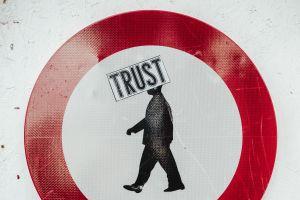Blockchain Is Saving Trust By Making It Irrelevant
Trust is in crisis. Since witnessing a healthy peak of 77% in 1964 (according to data concerning the US government), it has repeatedly sunk to discouraging lows. In 2017, only 47% of the general global population trusted the ‘four institutions’—the government, the media, business, and non-governmental organizations, Edelman’s annual Trust Barometer revealed.

There is, in other words, a distinct lack of belief that such institutions are doing what they claim to be doing, a lack that has arguably engendered the surge of authoritarianism and populism the world has seen in recent years.
Yet there’s hope for those who fear that trust—particularly in institutions—might become an endangered species. Digital innovations (e.g. the internet) have already begun helping to increase transparency over the past decade or so, by making government processes and outcomes more accessible to the public. And more recently, a new technology has emerged that promises to increase transparency even further: f ‘the blockchain’. While there are different types of blockchain, and examples of them being applied to real-world problems still remain very limited, their base functions make them a seemingly ideal solution for our lack of faith in institutions (and in each other).
Essentially, blockchain are decentralised digital ledgers, records of information maintained by distributed networks. Because they’re maintained by such networks, the info they store can be updated and altered only if every single node within the network agrees on the exact content of an update. As such, they can never be corrupted or falsified, while the decentralised—and public—nature of the network ostensibly removes the need for anyone to trust in a central institution or middleman.
Their potential for revolutionising trust is therefore considerable, something which hasn’t gone unnoticed by the growing number of Baltic and Nordic startups trying to replace centralised organisations with blockchain-based platforms. Such startups are targeting a range of sectors, such as e-commerce, media, energy, education, social networks. Their efforts are being increasingly complemented by local and national governments, which are beginning to look into the possibilities of using blockchain for reducing corruption and increasing efficiency. However, while there’s certainly a lot of potential in this area, a closer investigation reveals that the decentralisation of blockchain has its limits, still making trust in central institutions necessary.
Decentralisation = immutability
Anexample of blockchain technology being applied to an area where there’s a clear and justified use for it is provided by Monetha, a startup founded in 2017 in Lithuania. Monetha released its Beta version of the platform in June that aims to provide “universal/transferable trust” for the e-commerce industry. Simply put, buyers and sellers using the platform will be able to build up a single reputation rating for all the online marketplaces (e.g. eBay, Amazon) they visit.
The company’s co-founder Andrej Ruckij explains the issues Monetha addresses:
“There are multiple reports of reputation systems manipulating their records. Swaying the average records both ways, even almost blackmailing companies to delete unfavourable reviews.”
Monetha aims to resolve these problems by putting customer and business ratings on the blockchain, which, due to its decentralisation, makes the records it keeps unchangeable, or ‘immutable’ in blockchain-speak.

As Ruckij says, “Immutability is one of the main factors that is going to encourage trust between users of Monetha […] Immutability allows you to trace the whole evolution of a user’s reputation which makes it easier for you to make a decision.”
“Immutability” is also highlighted as a key blockchain feature by Mantas Aleksiejevas, the chief business development officer at WePower. Based in Lithuania, WePower will begin testing its own energy-trading platform in July and is scheduled to be operational in Spain, Australia and Estonia by November. According to Aleksiejevas, much of its purpose revolves around the fact that certification of sustainability is often “susceptible to fraud, corruption and manipulation.”
“The fact that [blockchain] runs an open, decentralised, immutable ledger gives the opportunity to transparently monitor energy production and accounting,” he clarifies. “Anybody and everybody can see what sort of energy their consumption is composed of.”
Such openness and transparency are one of the happy side-effects of decentralisation. Another advantage of decentralisation is that trust gets detached from central institutions or companies.
“Decentralisation brings the power of owning your reputation rather that giving it to a centralised marketplace which does not let you export and apply your hard-earned reputation in other mediums,” Ruckij says.
This ‘ownership’ of reputation is important, since it will help to increase the overall levels of trust within a society, given that people can effortlessly transfer trust from one place to another, rather than having it siloed in a single location. Trust will therefore expand to reach wherever a blockchain reaches.
Effects on interpersonal trust
While Monetha and WePower promise to increase trust between businesses and customers, one other company is setting its sights on increasing trust on a more human, culturally oriented level. White Rabbit is a Norwegian startup that’s building a blockchain-based platform through which users can directly pay the makers of the films and TV series they stream online. Planned for official launch in early 2019, its upcoming platform will revolve around a browser plugin that automatically recognises the content a user is streaming “from any [peer-to-peer] or open server streaming site”. Its reach and commercial potential has already earned it deals with production companies such as K5 International.
The platform’s use of blockchain and smart contracts (a computer code that executes certain agreements and eliminates the need for a middleman) will ensure that streaming revenues are distributed transparently, with no room for “mistakes or mischief.”
CEO Alan Milligan explains that transparency will improve relations and creativity within the film industry.
“If you take money out of the equation,” he says, “I find human relations improve dramatically. I think the least mentioned advantage of blockchain is how it fosters human trust. We no longer have to be suspicious or worried about getting ripped off, meaning we can focus our relationships on all the other exciting, creative and forward-thinking ideas and challenges that lie ahead.”
Similarly, the platform will alter the relationship between content creators and fans, who will “become responsible rebels” by virtue of paying for TV and film while still streaming through ‘unofficial’ peer-to-peer apps. In addition to this, White Rabbit plans to introduce virtual reality film screenings and forums where fans can interact with filmmakers, enabling the kind of fan-artist relationship that wouldn’t be possible if people weren’t using the platform and its cryptocurrency to pay for content.

While the decentralisation of the blockchain is likely to improve interpersonal levels of trust in the case of White Rabbit, other platforms serving other needs are likely to witness contrasting effects. For example, Sola (formerly Plague) is a Lithuanian startup that’s already operating a decentralised social network with almost 1 million users. Having sold over two million dollars’ worth of its SOL token in an ICO that ended in December, it’s set to distinguish itself from the likes of Facebook and Twitter by establishing a reward system for its users. Because it’s decentralised (i.e. its source code is open) it’s considerably less prone to censorship, cyberattacks, misinformation, or disproportionate influence from any single set of coders or service creators. However, Sola’s marketing manager, Elena Arkhipova, explains that this will have the wider effect not so much of increasing trust between people or groups, but of increasing trust in systems and platforms.
“Blockchain is based on the ‘no one can trust anyone’ principle,” she says.
“In such systems, the level of trust is obviously higher, since everyone only trusts information they own [or can access]. However, it is not a trust held between people, but more a trust between people and the system. So if we are talking about changing the nature of trust, it’s moving from a personal level to trusting the system instead.”
In short, the blockchain may end up providing a solution to the 21st Century’s lack of trust not by finding a way to increase said trust, but by largely side-stepping it.
Decentralising everything

Despite blockchain’s relative immaturity, a number of commentators believe it’s only a matter of time before decentralised ledgers become ubiquitous, causing significant impact as a result. Swedish entrepreneur and author Johan Staël Von Holstein is one of them. He suggests that the technology is part of a historical progression towards the decentralisation of power and wealth—the government’s ability to affect situations is going to decrease, while individual freedom and responsibility are going to increase.
“Blockchain is facilitating that, and the favourable perspective is that we will be able to affect decisions to be made, carried out and evaluated in a much more trustworthy and profound way than ever before, through the transparencies that are enabled via blockchain,” Staël Von Holstein says.
These are big claims, but Staël von Holstein—an early dot-com investor as well as a noted speaker on technology—believes they’re highly probable since blockchain will “create [economic] abilities that are unstoppable.” Blockchain will provide the companies, institutions and nations using it with a competitive advantage over those that don’t, enabling them to become more profitable and more efficient, and will cause people to “simply move from the countries not making the necessary changes” as a result. This will put these countries at a disadvantage which will eventually force them to embrace blockchain. Once they open the floodgates, greater trust is likely to follow, at least insofar as blockchains allowing us to get rid of hulking, centralised institutions that are often inefficient or corrupt.
“If people know how much money […] is taken out of the hospital industries by politicians buying consultancy work that is unnecessary or leads to nothing; if they see exactly how much money is going where and what they’re getting out of it, there are going to be some serious changes,” he adds.
In the short term the use of blockchain is going to benefit governments immensely, because they’re going to be faced their inefficiency and will improve the system, according to Staël von Holstein. Increased transparency will cause people to start trusting the government more. In the long run, however, the entrepreneur estimates that blockchain will disrupt the centralisation of government and of politics. “Once you start decentralising this, it will eventually decentralise everything.” This might encourage people to move from trusting traditional public bodies and groups to trusting decentralised technology platforms.
Does blockchain need government?
National governments are becoming increasingly open to the use of blockchain technology. This is shown by a number of recent developments: the Swedish government’s plan to use its own private blockchain for land registration; the recently announced European Blockchain Alliance; the November agreement between the Estonian, Latvian and Lithuanian governments to cooperate on blockchain development; and the Danish Foreign Ministry’s December report on the possibility of using blockchain technology for the delivery of foreign aid. However, as encouraging as it is to see such governments flirting with blockchain tech, it’sso apparent that if they do actually manage to roll out blockchain platforms, the trust in the platforms they use is likely to be a function of public trust in them.
This can be seen clearly in the case of Denmark. René Taus Hansen, the Deputy Head of Department at the Danish Ministry of Foreign Affairs, reports that the Ministry remains receptive to its partners using blockchain platforms. However, while he affirms that decentralisation will help foster greater transparency in the area of foreign development assistance, big dilemmas remain regarding governance of the platforms.
“Decentralised platforms built on blockchain still need to be regulated by someone,” he says, “land rights or a personal ID stored on a private blockchain still have to be enforceable in court and therefore the algorithm needs to be sanctioned to some extent.”
One of the biggest challenges facing the technology therefore may not be the technology itself, but the governance and regulation behind it.
Such comments resonate with criticism the blockchain has received from the likes of Kai Stinchcombe, CEO of True Link Financial, the US-based financial services company. He pointed out in a recent Medium blog post that a truly ‘trustless’ platform (e.g. for delivering aid, or for selling eBooks) would require users to take the trouble to audit its integrity and the integrity of the data it holds. This would be prohibitively time-consuming if blockchain were to become commonplace. Since such auditing isn’t practically feasible for 99% of us, we would be forced to go back to trusting a middleman or an institution, whose association with the blockchain we’re using would give us the confidence to trust that it works.
Unstoppable?
Still, even if centralised institutions will always be necessary, this doesn’t mean that blockchain won’t ultimately increase people’s trust in them, in businesses and in each other. By applying blockchain to a process, a company, group or government will inspire greater trust in this process and in itself, since it will give the inquisitive among us a chance to scrutinise said process and it will also show that the organisation in question is serious about doing things transparently and justly. This can only be a good thing, and even though it’s arguable that plenty of things will remain ‘off-chain’—things that won’t be transparent or immutable—the introduction of blockchain in one area will create pressure for it to be introduced elsewhere. As Johan Staël Von Holstein says regarding the recent spread of cryptocurrencies, initial coin offerings (ICOs) and blockchains, “It’s absolutely unstoppable.”
___________

This article has been brought to you in collaboration with N WIND, a free magazine about creativity and culture in North Europe. Find it in Baltics and at issuu.com/n_wind




